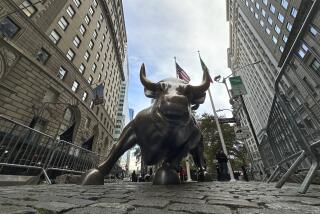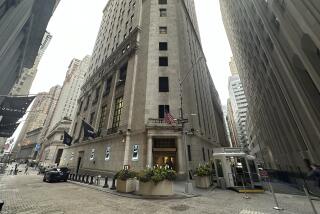Most Stocks Slide as Oil Prices Rocket : Market Overview
* The Dow Jones industrials rose 14.99 points to 3,249.11, but the market overall was sharply lower.
* Oil prices rocketed to their highest since December, propelled by tensions between the United Nations and Libya.
* Interest rates fell as the March employment report raised further doubts about the economy. The news also sent the dollar down to its lowest level against the German mark in six weeks.
Stocks
The March employment report seemed to sour many investors. Experts said the report indicated that the economic rebound will be slow at best.
The news helped propel a moderate selloff in industrial stocks that had risen sharply earlier this year on hopes of a strong recovery.
The Dow index managed to rise only because of its heavy component of oil stocks, which surged with the price of oil.
In the broad market, losing issues outpaced winners 943 to 673 on New York Stock Exchange. Volume rose to 202 million shares from 185 million on Thursday.
Smaller stocks were hit hard: The NASDAQ composite index fell 3.81 points to 590.01. For the week, the NASDAQ plunged 2.4%, while the Dow inched up 0.5%.
Analysts said the continued weakness in the broad market may mean a steeper correction soon. âThe underlying tone of the market has changedâ from optimism to pessimism, said Jim Schroeder, analyst at MMS International.
The marketâs near-term fate now may be determined by first-quarter corporate earnings reports that should begin to trickle out next week, experts said. âUnless the earnings numbers are up, we are more positioned for a continued decline,â Schroeder said.
Among the market highlights:
* Industrial stocks losing ground included Monsanto, off 1 5/8 to 63 1/2; Ingersoll-Rand, down 2 1/4 to 58; Eaton, off 1 3/8 to 71 1/8; Alcoa, which fell 2 1/2 to 68, and Stanley Works, down 2 1/2 to 41 3/8.
* Brokerage stocks fell further after sharp declines on Thursday, as investors fretted that the bull market may wind down with the economy. Merrill Lynch lost 1 1/2 to 51, PaineWebber fell 1 to 19, A. G. Edwards slid 3/4 to 22 7/8, and Quick & Reilly tumbled 1 7/8 to 24 1/8.
* Long-depressed oil stocks were the marketâs major bright spot, responding to soaring crude prices. Chevron jumped 3 1/8 to 66 1/2, Exxon added 1 1/8 to 55 7/8, Texaco leaped 2 1/8 to 59, Arco soared 3 1/2 to 101 7/8, and Unocal gained 1 to 21 3/8.
* Some investors sought safety in old-favorite growth stocks. AT&T; rose 1 1/2 to a new 52-week high of 42, Coca-Cola added 2 1/8 to 83, and Disney gained 1 7/8 to 158 3/8, a new all-time high.
Overseas, Tokyoâs Nikkei index rallied after a disastrous week, gaining 273.68 points late in the day to close at 18,559.71. But it lost 1,077.28 points for the week.
In London, the Financial Times 100 index fell 22.7 points to end at 2,382.7, down 65.2 points for the week. In Frankfurt, the DAX index slipped 2.03 points to 1,719.63, finishing up 8.18 points for the week.
Commodities
Oil prices soared as worries rose that Libya and the United Nations are headed for a showdown.
Crude oil futures for May jumped 49 cents to $20.29 a barrel, the highest since Dec. 5, on the New York Mercantile Exchange.
The United Nations this week imposed sanctions on Libya for refusing to turn over two men accused of bombing a Pan Am jet in 1988. Libya vowed to take revenge on countries that voted for the sanctions. Libya is the seventh-largest OPEC oil producer.
Also helping the oil rally was a report that showed OPEC had successfully cut back its production in March to adjust to a traditional spring lull in demand.
âThe rally started out on the timid side, but May crude oilâs move above $20 a barrel was technically significant,â said Jerry Samuels, a broker at Arb Oil Inc.
Elsewhere, spot gold rose 30 cents to $341.80 an ounce on New Yorkâs Comex; silver was unchanged at $4.09.
Credit
Short-term and long-term interest rates fell after the weak March unemployment report lifted expectations that the Federal Reserve may be forced to lower interest rates further.
The price of the Treasuryâs 30-year bond rose 13/32 point, or $4.06 per $1,000. Its yield fell to 7.87% from 7.91% Thursday.
The discount rate on six-month T-bills tumbled to 4.03% from 4.13% Thursday.
After months of worry that the economic recovery would be too strong, the March employment report seemed to assure many bond traders that any growth will be slow--leaving little chance that demand for money would rise sharply. In fact, more traders began to talk about the chance that interest rates could fall sharply again if the Fed decides the economy needs help.
The fed funds rate, the rate on overnight loans between banks, was at 3.5%, down from 4%.
Currency
The dollar plunged against most currencies, as the March employment report suggested a weak U.S. economy also would keep the dollar weak for some time to come.
The dollar finished in New York at 1.627 German marks, down from 1.644 Thursday. Against the Japanese yen, the dollar ended at 133.45 versus 133.70.
More to Read
Inside the business of entertainment
The Wide Shot brings you news, analysis and insights on everything from streaming wars to production â and what it all means for the future.
You may occasionally receive promotional content from the Los Angeles Times.










